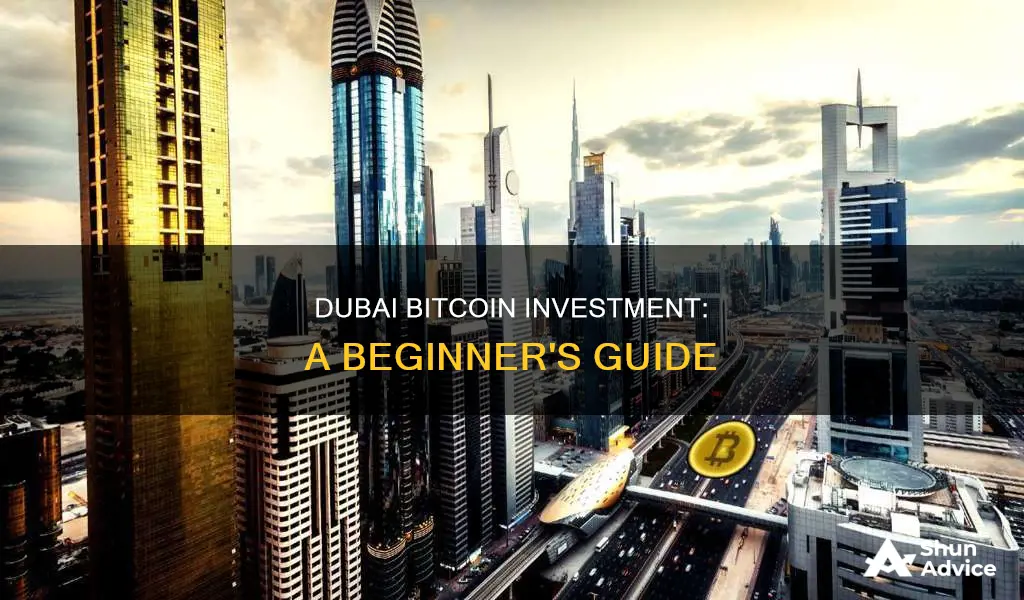
Investing in Bitcoin in Dubai is a relatively simple process, but it's important to do your research and understand the risks involved. While the United Arab Emirates doesn't recognize Bitcoin as a legal tender, it is not banned, and the country has been one of the more progressive crypto countries. Here are some key things to know about investing in Bitcoin in Dubai:
- Choose a Reliable Exchange: Select a reputable cryptocurrency exchange that is local or international, such as BitOasis, Rain, or eToro. These platforms allow you to buy, sell, and trade Bitcoin and other cryptocurrencies.
- Get a Crypto Wallet: It is essential to have a secure crypto wallet to store your Bitcoins. You can choose between software and hardware wallets, with the latter being considered more secure. Popular options include Ledger Nano X and Trezor.
- Understand the Risks: Investing in Bitcoin is a high-risk venture. The value of Bitcoin can fluctuate significantly, and there are associated fees and taxes to consider. Always be prepared to lose the money you invest.
- Research the Process: Familiarize yourself with the steps involved in buying Bitcoin, which typically include signing up on an exchange, verifying your account, and making a purchase using a payment method such as a credit card or bank transfer.
- Stay Informed: Keep yourself updated with the latest news and regulations regarding cryptocurrency in Dubai. The regulatory environment is evolving, and staying informed will help you make more informed investment decisions.
| Characteristics | Values |
|---|---|
| Difficulty | High-risk investment with potential for loss |
| Recognition | Not recognised as legal tender in the UAE |
| Exchanges | Rain, eToro, BitOasis, Palmex, BC Bitcoin, Changelly, Binance, CEX.io, Kraken, CoinCorner, Paybis, Uphold, Bitfinex, etc. |
| Payment Methods | Bank transfer, credit card, debit card, SWIFT transfer, cash |
| Wallets | Ledger Nano S, Trezor, eToro, BitOasis, etc. |
| ATM Availability | Limited, with only one Bitcoin ATM in the UAE |
What You'll Learn

How to choose a bitcoin exchange
When choosing a Bitcoin exchange, there are several factors to consider. Here are some key things to keep in mind:
- Security: Crypto exchanges are a prime target for hackers. Look for an exchange that has robust security protocols in place, such as two-factor authentication, cold storage of assets, and insurance funds to compensate customers in case of losses.
- Fees: Crypto exchanges typically charge trading fees, withdrawal fees, and other transaction fees. Research the fee structure of different exchanges to find one that suits your needs. Some exchanges offer flat transaction rates, while others have more flexible structures.
- Payment methods: Different exchanges support different payment methods for depositing funds or purchasing cryptocurrencies. Consider whether you prefer to use bank transfers, credit/debit cards, or other digital payment options, and choose an exchange that supports your preferred methods.
- Supported assets: If you plan to trade cryptocurrencies beyond Bitcoin, check the list of supported assets on each exchange. Some exchanges only support a few cryptocurrencies, while others allow trading of hundreds.
- User interface and experience: An exchange with an intuitive interface and good user experience will make it easier to trade cryptocurrencies. Consider your own preferences and choose an exchange that aligns with your needs.
- Reputation and reviews: Research the reputation of each exchange by searching for reviews and evaluating their security and business practices. Look for any complaints or reports of scams and evaluate the exchange's terms and conditions for anything alarming.
- Regulation and compliance: Different exchanges comply with different laws and regulations based on their locations and practices. Consider whether you prefer a decentralised or centralised exchange, and check if the exchange meets relevant Know Your Customer (KYC) and Anti-Money Laundering (AML) practices.
- Volume and liquidity: Check the trading volume and liquidity of each exchange, as this can impact how easily you can enter or exit positions. Low-volume exchanges may have limited sellers, affecting your ability to trade certain cryptocurrencies.
- Fiat compatibility: If you plan to transfer national currencies (e.g. USD, EUR) into the crypto world, ensure the exchange is fiat-compatible and works with the banks and fiat currencies you need.
Remember, choosing the right crypto exchange is crucial as it can impact your success as a trader or investor. Always conduct thorough research and due diligence before making any decisions.
Bitcoin: Exploring Alternative Investment Opportunities
You may want to see also

How to set up a bitcoin wallet
There are several types of Bitcoin wallets, including hosted wallets, non-custodial wallets, and hardware wallets. The right one for you will depend on your needs and preferences. Here's a step-by-step guide on how to set up each type of wallet:
Hosted Wallet
- Choose a platform that you trust, considering factors like security, ease of use, and compliance with relevant regulations.
- Create your account by entering your personal information and choosing a secure password. It is recommended to enable two-factor authentication for added security.
- Buy or transfer cryptocurrency to your wallet. Most platforms allow you to purchase crypto using a bank account or credit card.
Non-Custodial Wallet
- Download a wallet app such as Coinbase Wallet.
- Create your account. Unlike hosted wallets, non-custodial wallets do not require you to share any personal information, not even an email address.
- Write down your private key, which is typically presented as a random 12-word phrase, and keep it in a secure location. Losing or forgetting this phrase will result in the loss of your crypto assets.
- Transfer cryptocurrency to your wallet. Non-custodial wallets typically do not support the purchase of crypto using traditional currencies, so you will need to transfer crypto from another source.
Hardware Wallet
- Purchase the hardware from a reputable brand such as Ledger or Trezor.
- Install the necessary software by downloading it from the official company website. Follow the instructions provided to set up your wallet.
- Transfer cryptocurrency to your wallet. Similar to non-custodial wallets, hardware wallets usually do not support the direct purchase of crypto using traditional currencies.
Additional Considerations for Bitcoin Wallets:
- Security: Cold storage hardware wallets are widely accepted as the most secure way to protect your coins.
- Built-in Wallets: Many Bitcoin exchanges offer built-in wallets, but these are centralised and vulnerable to theft. It is generally recommended to use a separate wallet for added security.
- Transaction Fees: Different exchanges and wallets have varying transaction fees, withdrawal limits, and verification processes. Consider these factors when selecting a platform.
The Ultimate Guide to Bitcoin Exchange Investment
You may want to see also

How to buy bitcoin in Dubai
Dubai is a global city and business hub that has established itself as a free-trade oasis. The city has been at the centre of the gold trade since the 1960s and is now a major global transport hub for passengers and cargo.
In recent years, Dubai has also become a pioneer of blockchain initiatives within its government. The city is home to approximately 2 million citizens and, while the UAE doesn't recognise Bitcoin as a legal form of tender, it is not banned.
Choosing a suitable cryptocurrency trading platform
Multiple UAE-based cryptocurrency exchanges offer bitcoins, as well as a number of other digital currencies. Analysts cite the low tax rate, regulatory environment and political stability as reasons why a number of exchanges and digital currencies base themselves in the Emirates.
You can use local exchanges or select one of the many international exchanges that accept accounts from the Emirates. Sites such as localbitcoins.com publish local buyers and sellers in the UAE, along with payment methods and bid and offer prices.
Many Middle East-based investors may prefer to use a regional cryptocurrency exchange, rather than one based in countries such as the US or Europe. Many foreign-based exchanges, such as the US-based CoinBase, don’t allow people based outside of certain geographic areas to trade on their platforms.
- BitOasis is one of the largest cryptocurrency exchanges in the Middle East. It is based in Dubai and supports many of the largest cryptocurrencies, including Bitcoin, Ethereum, and Litecoin.
- Rain is a crypto exchange focused on serving the UAE, Saudi Arabia, Bahrain, Oman and Kuwait. It offers 24/7 support and is licensed by the Central Bank of Bahrain as a Crypto Asset Brokerage.
- EToro is a trading platform and crypto exchange. It supports Bitcoin, Ethereum, Litecoin, Zcash and many other coins. Deposits can be made quickly via bank transfer, SEPA, NETELLER, PayPal and more.
- CoinCorner is a long-standing British Bitcoin exchange offering a variety of Bitcoin products and services to individuals and businesses around the world. CoinCorner currently supports 30+ countries, including the UK, Europe, and the UAE.
- Bitex UAE is a Dubai-based secure, professional trading platform that facilitates the buying and selling of digital currencies including Bitcoin, Ethereum, Litecoin, and Ripple.
Choosing a secure Bitcoin wallet
Before you buy Bitcoin or any other cryptocurrency, it's crucial to have a secure form of storage. Popular hardware wallet choices among UAE residents include the Ledger Nano S or the Trezor. Cold storage hardware wallets are widely accepted as the ideal way to protect your coins.
Many Bitcoin exchanges offer built-in wallets, but they're centralised and, as a consequence, vulnerable to theft. Since it is never recommended that you leave your cryptocurrency on an exchange, purchase a wallet of your own for security reasons (preferably a hardware wallet).
Once you have chosen a trading platform and wallet, the next steps are to verify your identity, add your payment method, and buy Bitcoin.
- Sign up on the platform, and verify your account.
- In order to make a purchase, you will have to create a voucher so that you can exchange it for the number of bitcoins you want. To do this, you will need to make a payment via credit card or bank transfer. The credit card takes less time and is the most recommended method.
- Click on the “Buy Bitcoin” tab found on the left side of the page, input the amount (voucher amount) as well as the payment method, in this case, credit card, and then hit Next. The charges will be around 6%, so you will pay a processing fee of 300 AED for bitcoins worth 500 AED.
- Confirm the payments by clicking “Proceed With Payment,” and you will redirect to the platform’s payment gateway, where you will need to fill in your credit card details.
- Click on the “Pay Now” tab and wait for verification of the transaction. This could take anywhere from a few minutes to 15 minutes, depending on the number of requests.
- Done! After some time, you will see the bitcoins in your BitOasis wallet.
Bitcoin Mining Investment: How Does It Work?
You may want to see also

How to sell bitcoin in Dubai
While the UAE doesn't recognize Bitcoin as a legal form of tender, it is not banned, and buying and selling Bitcoin is pretty easy.
There are several ways to sell Bitcoin in Dubai, including:
- Using a Bitcoin ATM – There is currently one Bitcoin ATM in the UAE, located in the Rixos Premium Hotel in Dubai. Bitcoin ATMs are a quick and easy way to sell Bitcoins and are also private. However, they typically charge high fees of 5-10%.
- Using a Local Exchange – Local exchanges such as BitOasis, the largest cryptocurrency exchange in the Middle East, allow users to sell Bitcoin. BitOasis supports multiple cryptocurrencies, including Bitcoin, Ethereum, and Litecoin, and charges low fees.
- Using a Global Exchange – Global exchanges such as eToro, Rain, and Uphold can be used to sell Bitcoin in Dubai. These exchanges offer a wide range of features and payment methods but may have higher fees and require ID verification.
- Using a Peer-to-Peer Exchange – LocalBitcoins and other P2P exchanges allow users to sell Bitcoin for a variety of payment methods. While this option may introduce more risk, it can be mitigated by using the platform's escrow services and only trading with reputable users.
- Using a Bitcoin Debit Card – Bitcoin debit cards, such as those offered by Uquid, allow users to spend Bitcoin anywhere that Visa or MasterCard is accepted. They can also be used to withdraw cash from ATMs, making them a convenient way to access funds from Bitcoin sales.
When selling Bitcoin, it is important to consider factors such as fees, security, and ease of use. It is also crucial to comply with local regulations and pay any applicable taxes on capital gains.
Dogecoin Investment: Worth the Risk?
You may want to see also

How to avoid bitcoin scams in Dubai
While the United Arab Emirates doesn't recognize Bitcoin as a legal form of tender, it is not banned, and buying and selling Bitcoin is pretty easy. However, as with any investment opportunity, there is always a risk of scams. Here are some tips to help you avoid potential Bitcoin scams in Dubai:
- Do Your Research: Before investing in any cryptocurrency, ensure you understand how it works. Research the company, read their white paper, find out who runs it and how it operates, and look for genuine reviews and testimonials.
- Be Wary of Social Media: Crypto scammers often use social media to promote their schemes. Be cautious of adverts on social media, and do not trust celebrity endorsements at face value. Scammers may use unauthorized images of celebrities or high-profile businesspeople to create a false sense of legitimacy.
- Ignore Cold Calls and Direct Messages: If someone contacts you out of the blue with an investment opportunity, it is likely a scam. Do not disclose personal information or transfer money to these individuals.
- Only Download Apps from Official Platforms: While fake apps can sometimes find their way onto official app stores, it is still safer to download apps from Google Play or the Apple App Store than from unknown sources.
- Be Cautious of High-Pressure Sales Tactics: Scammers often use high-pressure tactics, such as promising bonuses or discounts for immediate participation. Take your time, do your research, and do not rush into any investment.
- Protect Your Wallet: Keep your private keys secure and never share them with anyone. Use a trusted hardware wallet, such as the Ledger Nano X or Trezor, to store your Bitcoins. Avoid built-in wallets offered by exchanges, as they are more vulnerable to theft.
- Beware of Phishing Scams: Double-check website URLs, as scammers often create fake websites with slightly altered domain names. Be cautious when clicking links or providing sensitive information online.
- Reject Up-Front Fees: Be wary of any investment opportunity that requires an upfront fee, especially if the fee must be paid in cryptocurrency.
- Avoid Promises of Guaranteed Returns: No financial investment can guarantee future returns, as all investments carry some level of risk. Be cautious of any crypto offering that promises guaranteed profits.
- Be Alert for Red Flags: Look out for warning signs such as excessive marketing, poor or non-existent white papers, anonymous team members, and promises of free money or guaranteed riches.
- Report Scams: If you encounter a scam or suspect fraudulent activity, report it to the relevant authorities and platforms. In the UAE, you can report scams to the Federal Trade Commission (FTC) or the Dubai Financial Services Authority (DFSA).
Remember, investing in Bitcoin and other cryptocurrencies carries inherent risks, and it is essential to be vigilant to protect yourself from potential scams. Always do your due diligence and never invest more than you can afford to lose.
The Bitcoin Investment: Missed Opportunities and Lessons Learned
You may want to see also
Frequently asked questions
You can use a crypto exchange to buy Bitcoin in Dubai. Examples of popular exchanges include Rain, eToro, and BitOasis. You can also use a Bitcoin ATM or teller machine to buy Bitcoin with cash.
It's important to research different exchanges before selecting one. Some factors to consider include transaction fees, withdrawal limits, payment modes, and verification processes. You should also ensure that the exchange is available in your country and offers the specific cryptocurrencies you're interested in.
Yes, investing in Bitcoin is considered a high-risk investment. The value of Bitcoin can fluctuate significantly, and there is always the possibility of scams or exchange hacks. It's important to do thorough research and only invest what you can afford to lose. Additionally, while not banned, Bitcoin is not recognised as a legal tender in Dubai, and there are restrictions on using cryptocurrencies for payments or deposits.







